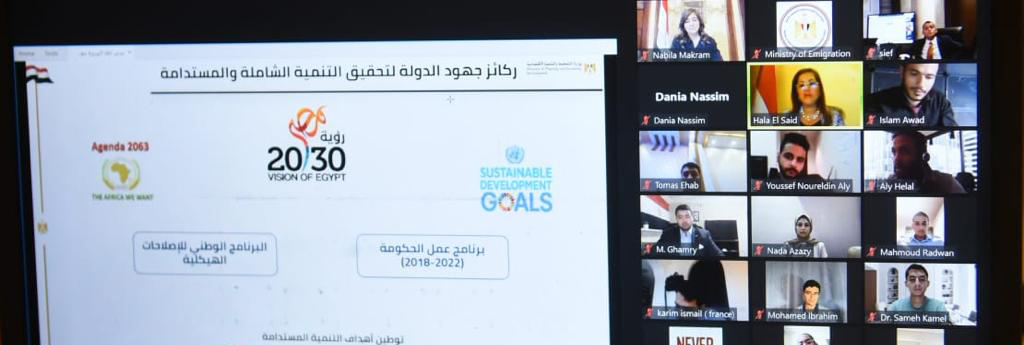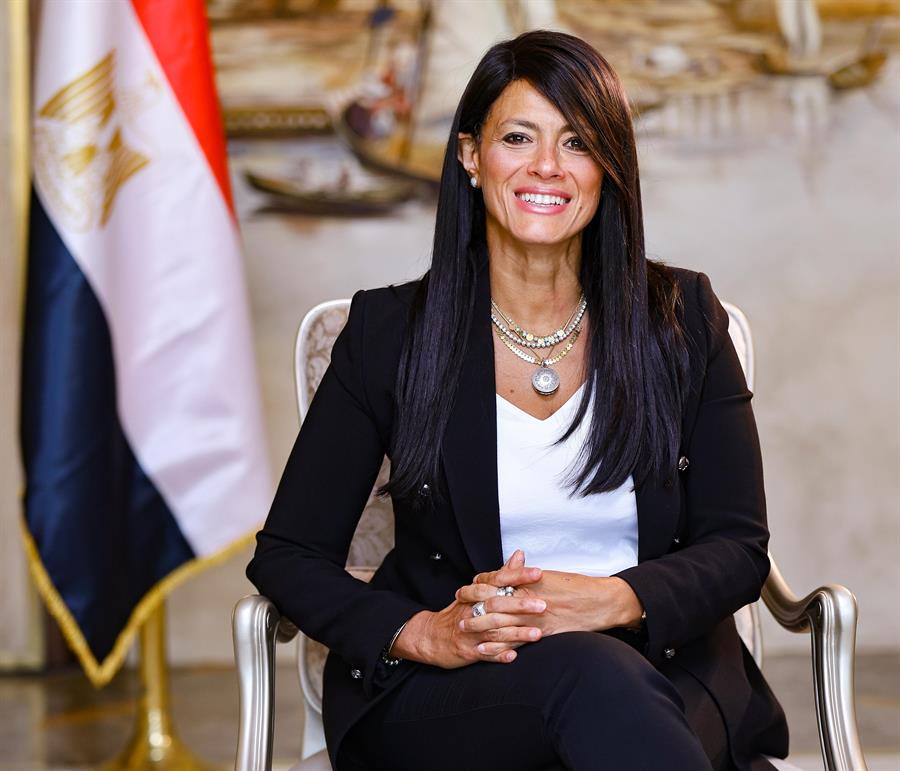Planning, Immigration ministers hold a meeting with young Egyptians studying abroad

25 August 2021
We have achieved a qualitative leap in the national program for structural reform and the national project for the development of the Egyptian countryside, "Decent Life”: Says Hala-El-Said
Dr. Hala El-Said, Minister of Planning and Economic Development, and Ambassador Nabila Makram, Minister of State for Immigration and Egyptians Abroad Affairs, held recently a panel discussion with young Egyptians studying abroad via the “Zoom” application, within the framework of the activities of the Ministry of Immigration Center for Dialogue “MEDCE”, and in light of the National Strategy for Egyptian Youth Studying Abroad, launched by the Ministry of Immigration in January 2021.During the meeting, Dr. Hala El-Said reviewed the role and tasks of the Ministry of Planning and Economic Development and its affiliates, and the most important development programs and projects that the ministry is implementing, which are represented in Egypt Vision 2030, the National Structural Reform Program, the national project for the development of the Egyptian countryside "Decent Life", the Rowad 2030 project, the voluntary national report, the national project for the development of the Egyptian family, the Egypt Award for Governmental Excellence, the initiative of ambassadors for sustainable development and the human development report.El-Said shed light on the development experience of Egypt in recent years, and the pillars of the state's efforts to achieve comprehensive and sustainable development, referring to the first phase of the National Program for Economic and Social Reform launched in 2016 and its most prominent measures represented in a package of legislative and institutional reforms, fiscal and monetary policy control and expansions in infrastructure projects.
Moreover, El-Said highlighted the partnership with the private sector, the establishment of The Sovereign Fund of Egypt, and the expansion of human development investments, confirming the success of this phase of the program, which resulted in a noticeable improvement in Egypt’s ranking in international indicators in 2019.
El-Said referred to the success of the Egyptian state in confronting the Corona pandemic, as EGP (100) billion (2%) of the domestic product was allocated to finance the comprehensive response plan; which balances the health of individuals and the continuation of economic activity.
The confrontation plan has moved on 3 main pillars: alleviating the repercussions of the crisis on the citizen by supporting irregular employment through monthly grants, increasing the support provided to pensioners by 14%, increasing the tax exemption limit, facilitating banking transactions.She added that the second pillar is to support the affected sectors, by reducing interest rates, postponing and rescheduling debts, and tax payments, in addition to providing financing packages to the affected sectors.El-Said noted that the third pillar went around re-arranging priorities in development plans.On the structural reforms program, El-Said explained that it represents the second phase of the economic and social reform program, which was launched on April 27, 2021. The program primarily targets the real sector with radical structural reforms that contribute to transforming the Egyptian economy into a productive economy that enjoys competitive advantages, increasing the economy’s resilience Egyptian, raising the economy's ability to absorb external and internal shocks, which supports the economy's ability to achieve balanced and sustainable growth.
El-Said added that the main pillar of the program is to restructure the Egyptian economy by focusing on the real economy sectors: agriculture, industry, communications, and information technology.
The program is supported by five sub-pillars: improving the business environment and developing the role of the private sector, increasing the flexibility of the labor market and raising the efficiency of vocational training, investing in the capital human money, financial inclusion and access to finance, efficiency of public institutions and governance.
El-Said concluded her speech by referring to the challenges of the global labor market and employment, explaining that the jobs required in the future are jobs related to robotics, operation, maintenance, monitoring, and supply.
Moreover, the labor market needs jobs related to big data, jobs related to artificial intelligence systems, jobs related to 3D printing, and jobs related to digital currencies.
For her part, Minister of Immigration, Ambassador Nabila Makram explained that this meeting comes within a series of meetings that bring together our children studying abroad and state officials to transfer experiences to Egypt’s sons abroad.
Makram added that Egypt is proceeding at a steady pace despite the challenges, which is reflected in the international confidence in the Egyptian vision and the various development efforts, referring to the government's efforts in the strategy of building the human being and providing a decent life for all Egyptians.Makram highlighted the keenness of the political leadership to take care of the youth and provide safe alternatives to immigration through training and rehabilitation within the presidential initiative "Boats of Life", in addition to carrying out visits to national projects and new cities.
The seminar concluded by answering the questions of the Egyptian students studying abroad, as they affirmed that they will do their best to acquire sciences and experiences to transfer them to the homeland and to contribute to the renaissance witnessed by the Egyptian state in various fields.









